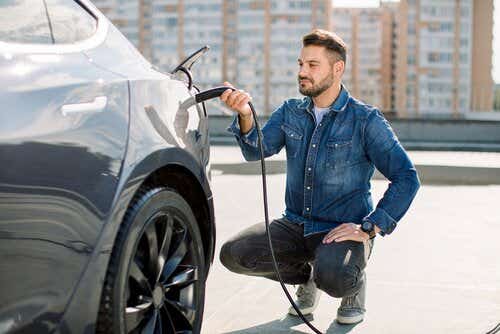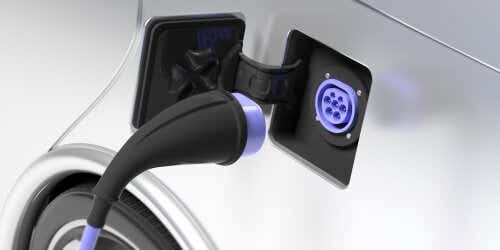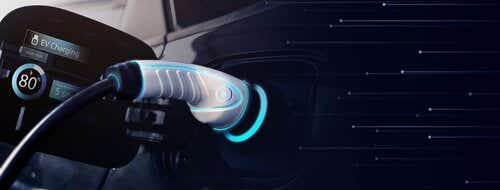How to charge an electric car at home
The easiest way to charge an electric car is at home. You can charge using a standard three-pin plug that you’d use to connect anything to the mains supply, but this is not the optimal way of doing it - it’s very slow, so it should only be used as a last resort.
Most electric car owners install home chargers in their driveways or garages exclusively for their own use. These home chargers are designed to work with electric cars so they can be fully charged in a matter of hours - most people charge overnight so they can take advantage of time-of-use EV tariffs that offer lower rates to use electricity during the night. The charger will also usually be tethered with the cable you need for your vehicle, so all you have to do is plug it in and leave it.
Unsure if you need an EV home charger? Find the advice you need for the stage you're at here.

I'm considering buying an EV
If you're thinking about getting an EV, what do you need to consider when it comes to charging?

My EV is on the way
If you've ordered an EV, what do you need to do to prepare for its arrival?

I already have an EV
If you have an EV and you're considering installing a home charger, we can help advise you.
How to charge an electric car at work
With many workplaces now investing in EV charge points, the next best place to charge your car could be while you’re in the office. Many workplaces are installing charging points for employees and visitors. They work in the same way as home chargers, though they’re likely to be untethered which means you’ll need to bring your own cable to connect your car - it’ll usually be a Type 2 connector.
In terms of charging speed, electric vehicle chargers provided by businesses will charge at about the same rate as home chargers.
How to charge an electric car at public charging points
When it comes to charging an electric car when on the go, drivers can do so via an increasing number of public EV charge points located throughout town centres across the country. You can find them outside supermarkets, leisure centres, cinemas and inside car parks, to name just a few places to look. They’re installed and operated by brands including Shell Recharge, BP Pulse and Ecotricity. Tesla also has its own Supercharger charging point network specifically for Tesla drivers.
Public charging points will usually charge at a 7 kW rate, providing about 30 miles of range per hour of charge (though some will charge at the faster rate of 22 kW). They’re probably best used to top up the car’s battery when you’re parked for an hour or two, rather than trying to get a full charge out of them. It’s worth bearing in mind that you may also have to pay to use them, which you’d do through an app on your phone, a dedicated electric car charging card or (increasingly) standard contactless payment depending on the provider.
How to charge an electric car on long distance journeys
If you use your car for long journeys, it’s almost certain that you’ll have to charge it at some point en route, though with battery capacities increasing, this could become less and less likely over the next few years. The best way of charging electric cars en route is to make use of the rapid public EV charge points most commonly found at service stations - this is because you’ll be stopping specifically to charge the car rather than top up while you’re shopping, so you’ll want it done as quickly as possible. Rapid chargers can give you an 80% charge in as little as 30 minutes.
Rapid charging rates start at 43 kW - alternating current (AC) chargers will use a Type 2 connector, so you’ll need a charging cable with a Type 2 connector as well. All direct current (DC) chargers use CCS and CHAdeMO 50 kW connectors, though cars fitted with a CCS connection can also accept a Type 2 connector, which will charge them at a slower rate.
How long does it take to charge an electric car?
Electric car charge speeds depend entirely on the car itself and the charging point being used, though it’s a safe assumption that slow chargers would be the slowest and rapid chargers would be the quickest. The table below shows the time it would take to charge the average electric vehicle battery from empty to full using different chargers.
| Type | Speed | Charging time |
|---|---|---|
| Slow charging | Up to 3.6 kW | 6-12 hours |
| Fast charging | 7-22 kW | 4-6 hours |
| Rapid charging | 43-50 kW | 30 minutes-1 hour |
FAQs
How much will it cost to charge my car at home?
When charging electric cars at home, there are a number of factors to take into consideration when you’re trying to calculate how much it will cost you to do so:
Your electricity tariff - your unit rate during the day and at night (if you have a time of use tariff) will affect how much you pay
The time you’re charging - if you have cheaper electricity at night, this is the optimal time to charge when thinking about outgoings
How long you’re charging for - the longer you have to charge your car for, the more it will cost
The type of car and the size of its battery - the bigger the battery, the longer it’ll take to charge and the more it could cost you
Your charging connection type - if you’re using a three-pin plug, it could take more than 24 hours to fully charge your electric vehicle, which would cost much more than using a dedicated charging point
It’s always worth remembering that, however much you calculate you’ll spend on charging your car, it’s going to be much less than filling up with petrol. While the initial outlay on an electric vehicle will be more than buying a petrol or diesel car, it will be cheaper to charge, run and maintain over the years.
How do I find public EV charge points?
There are various tools available to help electric car drivers find public charging points, such as Uswitch's EV charging points map.




